Ancistrocerus parietum
Classification
- Phylum: Arthropoda
- Subphylum: Hexapoda
- Class: Insecta
- Order: Hymenoptera
- Superfamily: Vespoidea
- Family: Vespidae
- Subfamily: Eumeninae
- Genus: Ancistrocerus
- Species: parietum
Pronunciation
How to pronounce Ancistrocerus parietum: //ænˌsɪstroʊˈsɪrəs ˌpæriˈiːtəm//
These audio files are automatically generated. While they are not always 100% accurate, they are a good starting point.
Images
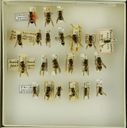
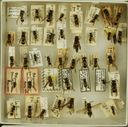
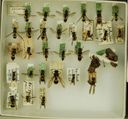
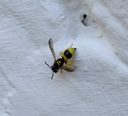
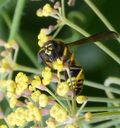
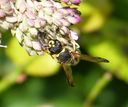
Summary
Ancistrocerus parietum is a species of insect in the family Vespidae, commonly found in Europe and North America. It nests in various cavities and is noted for its late seasonal activity, primarily from mid-August to early October. This species uniquely hunts a wider variety of caterpillars than many of its relatives. It was introduced from Europe before 1916.
Habitat
Nests in various types of cavities, including small holes in old walls.
Distribution
Native to Europe and North America.
Diet
Female hunts for various small hairless caterpillars, including some from butterfly species.
Tags
- Ancistrocerus parietum
- Vespidae
- Eumeninae
- caterpillar predator
- native species
- invasive species